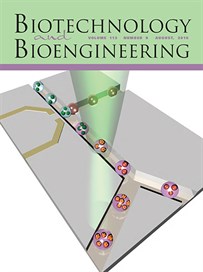 A team led by Dr. Arum Han, professor in the Department of Electrical and Computer Engineering at Texas A&M University, recently had its paper on droplet microfluidics-based systems for algal biofuel development published in the journal Biotechnology and Bioengineering as a front cover.
A team led by Dr. Arum Han, professor in the Department of Electrical and Computer Engineering at Texas A&M University, recently had its paper on droplet microfluidics-based systems for algal biofuel development published in the journal Biotechnology and Bioengineering as a front cover.
Han’s team has been developing microfluidic lab-on-a-chip systems that can be used as high-throughput screening tools to quickly evaluate the growth and oil production characteristics of numerous algal libraries, both natural and genetically engineered. The team’s paper describes how it developed a high-throughput algae analysis platform where a large number of cell-encapsulated pico-liter size droplets, each functioning as an independent photobioreactor, can be manipulated on a business card sized chip. The developed microsystem utilizes droplet microfluidics technologies to individually control and analyze each of these photobioreactors, and was used to screen algal strains showing improved growth and oil production characteristics.
Using these microsystems, Han and his collaborators Dr. Tim Devarenne and Dr. David Stern, are working together to transfer the valuable hydrocarbon synthesis pathway of the slow-growing alga, Botryococcus braunii, to faster-growing algae with commercial potential through metabolic engineering. This multidisciplinary team is currently funded under a $2 million award from the National Science Foundation’s (NSF) Emerging Frontiers in Research and Innovation (EFRI) office. With the new microsystem technology, the team is expected to significantly shorten the development time, where testing that previously required up to a year in a standard laboratory environment can be achieved in a few weeks.
Han, director of the NanoBio Systems Lab and an expert in microfluidic lab-on-a-chip technologies, joined the electrical and computer engineering department in 2005. His research is at the interface of micro/nano technology and life sciences, with interest in solving grand challenge problems in the broad area of health and energy through the use of micro/nano systems technology and multidisciplinary team effort.
The paper can be viewed on the Wiley Online Library website.